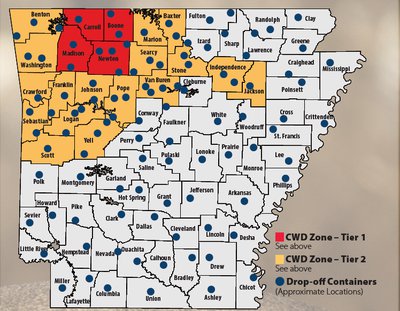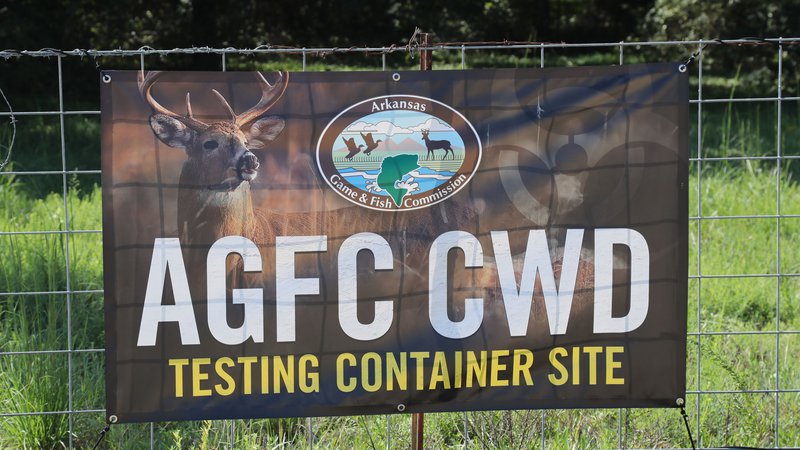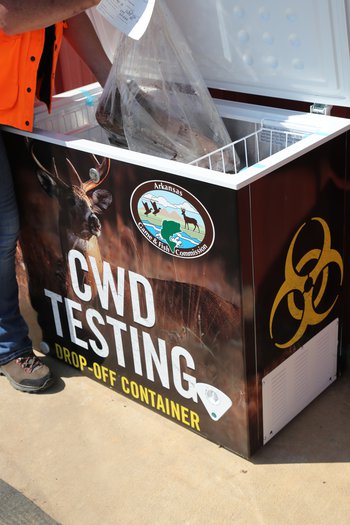Randy Zellers Assistant Chief of Communications
LITTLE ROCK — The Arkansas Game and Fish Commission will again offer a variety of free options to have harvested deer tested for chronic wasting disease during the 2021-22 deer hunting season. In all, 105 testing locations will be available throughout the state to have your deer tested for CWD.
According to AJ Riggs, wildlife health biologist for the AGFC, 7,824 CWD samples were collected last year, and 95 percent of those samples were voluntarily submitted from hunter-harvested deer.
“We had 261 positive CWD cases from those samples last year,” Riggs said. “And 96 percent of our positive cases came from deer taken by hunters.”
The most popular method for hunters to have their deer tested is through the AGFC’s system of drop-off containers throughout the state. Freezers are available throughout the state to drop off samples of harvested deer for testing. Simply bring the deer’s head with 4 to 6 inches of the neck attached and any antlers removed to the location and place it in one of the provided plastic bags with your name and contact information on the card provided. The AGFC will collect these samples and have them analyzed by the Arkansas Livestock and Poultry Commission laboratory. Testing results should be available within two to three weeks.
Riggs said anyone who submits a positive sample will be notified via phone as soon as the results come back.
“That’s why it’s so important to fill out the information card as clearly as possible and include all the information asked for,” Riggs said. “We want to get in touch with anyone who has a deer that tests positive as soon as possible so that we can make arrangements to dispose of that deer’s carcass properly and follow up with the exact location of harvest to continue tracking the disease in the state. We also can give a replacement tag to harvest another deer to make up for the lost meat.”
Riggs said the bottom half of the information card that the hunter keeps will have a code on it so that the hunter can verify results for themselves.
“We will call everyone with a positive sample, but we just don’t have the manpower to call and speak to everyone with a sample that CWD wasn’t detected on,” Riggs said. “The results are posted online and your confidential code will allow you to receive your results for peace of mind.”
In addition to the CWD sample locations, 57 taxidermists are available to pull samples for hunters free of charge. Some taxidermists have agreed to take samples from any deer submitted, even if it is not one that will be mounted.
“Our network of cooperating taxidermists has been very beneficial in tracking CWD throughout the state,” Riggs said. “It only takes them a few minutes to get the sample tissue needed for the test, and they’ve all been trained on how to submit their samples to us, so it’s been a very good partnership.”
All testing locations are available at www.agfc.com/cwd. Some of the locations have changed from last year, so hunters are encouraged to look ahead of time and find a sample location closest to their hunting area and note hours of operation.
“It’s also important to remember about the carcass transport restrictions when delivering samples,” Dr. Jennifer Ballard, state wildlife veterinarian for the AGFC, said. “You can’t cross CWD zones with your deer or sample, even for testing purposes. You can’t leave CWD Tier 1 (Boone, Carroll, Madison and Newton counties) with any portion of a deer or elk except cleaned skulls, antlers, deboned meat, hides, teeth and finished taxidermy. You can move deer from Tier 2 to Tier 1, but not outside of the overall CWD Management Zone, except for those parts just mentioned.”

Ballard also reminds hunters that the AGFC is currently partnering with the University of Georgia on a project to determine ongoing impacts of CWD on Arkansas’s deer herd in the Newton County area. Many deer have been outfitted with collars that have GPS technology to track the animal’s movements and notify researchers when the animal dies. Hunters are asked not to let the presence of a collar deter or encourage harvest of the animal.
“We want the results to apply during real-world scenarios,” Ballard said. “Deer were collared without regard to their CWD status, so the presence of a collar does not mean the animal has CWD.”
Ballard asks any hunter who shoots a collared deer to report it immediately to the wildlife hotline at 800-482-9262 so data can be collected as quickly as possible. Collared deer will still need to be checked like any other deer and the AGFC will make arrangements to test the deer. If CWD is not found in the collared deer, the hunter will be able to keep the meat. If it is CWD-positive, the AGFC will dispose of the meat for the hunter and reinstate their deer tag with one to make up for the loss of meat.
All testing locations will remain open until Feb. 28, the last day of the archery deer season.
A list of official testing locations is available at www.agfc.com/cwd as well as the latest regulations and news about the disease in Arkansas.







